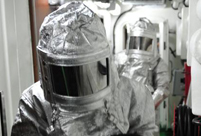 Martenitsa adds glamour to Bulgarian Embassy
Martenitsa adds glamour to Bulgarian Embassy
 Mysterious 'Dolan Tribe' in Xinjiang
Mysterious 'Dolan Tribe' in Xinjiang
 This is Shanghai
This is Shanghai
 Female attendants serving 'two sessions'
Female attendants serving 'two sessions'
 The many tears of DiCaprio
The many tears of DiCaprio
 Dan Dan's bittersweet opera life
Dan Dan's bittersweet opera life
 A dream wedding for a girl suffering from cancer
A dream wedding for a girl suffering from cancer
 Old photos of Anti-Japanese War (1937-1945)
Old photos of Anti-Japanese War (1937-1945)
 This is Beijing – Nanluoguxiang
This is Beijing – Nanluoguxiang
From the Earth to the Moon
While the Jade Rabbit moon rover sleeps on the moon, other dreams are taking wing.
Preparation for the 2017 launch of lunar probe Chang'e-5 is going as planned, said Ye Peijia, a top scientist with the Chang'e-3 lunar probe mission.
Chang'e-5, as part of China's third-phase lunar program, is expected to bring back moonrock samples to Earth, which Ye believes will be "a historic moment".
The more sophisticated Chang'e-5, including unmanned sampling and returning, requires breakthroughs in moon surface takeoff technology, sampling encapsulation, rendezvous and docking in lunar orbit, as well as high-speed Earth reentry.
To make sure the mission is a success, a Chang'e-5 test probe will be launched this year to rehearse the route, Ye disclosed.
Chang'e-2, launched on Oct. 1, 2010, is now China's first man-made asteroid, about 70 million km from Earth and heading into deep space. Ye said the ship could travel as far as 300 million km from Earth. "New discoveries cannot be ruled out," Ye said.
"We plan to send a manned mission to the moon. The Earth is our cradle, and humanity will go out from here someday. The moon is the nearest: if we cannot land on it, where else can we go?" he said.
THE MARTIAN CHRONICLES
China now has the capability to explore Mars by sending a probe to circle the planet and land, Ye said. The only question is when.
Humanity has launched more than 40 missions to planets in the solar system and over half of them have failed.
Zhang Bonan said that the logjam for a manned mission to Mars is still the technology.
"Exploration is the ultimate target of human beings. If we cannot break through the technological bottleneck, the future for the whole species will be bleak."
The life of Earth is limited compared with that of the whole universe, Zhang said.
"The future lies beyond the Earth," he said.
"We know so little about the Milky Way, and the whole universe is even more vast. There's too much for us to know," he said, adding that the "unknown" is the biggest drive for humans to explore.
Xinhua reporters Ren Qinqin, Hu Xing and Yan Qilei also contributed to the story.

 Chaihe village, pure and peaceful fairyland in snow
Chaihe village, pure and peaceful fairyland in snow Belgians warmly welcome arrival of China's giant pandas
Belgians warmly welcome arrival of China's giant pandas Female marines receive tactical training in NW China
Female marines receive tactical training in NW China Blood memory: Nanjing Massacre in 1937
Blood memory: Nanjing Massacre in 1937 Top 10 pure beauties in showbiz
Top 10 pure beauties in showbiz British WWII veteran: I can't forgive Japan
British WWII veteran: I can't forgive Japan Tongban's dream of prosperity
Tongban's dream of prosperity Chinese frigate Yancheng holds drills in Mediterranean Sea
Chinese frigate Yancheng holds drills in Mediterranean Sea A visit to comfort woman's home in South Korea
A visit to comfort woman's home in South Korea Fairyland? Qingdao in sea of clouds
Fairyland? Qingdao in sea of clouds Top 10 most handsome faces in Asia in 2013
Top 10 most handsome faces in Asia in 2013 Female celebs with beautiful long legs
Female celebs with beautiful long legs Cat 'guardians' in Forbidden City
Cat 'guardians' in Forbidden City Large numbers of ancient coins excavated in Inner Mongolia
Large numbers of ancient coins excavated in Inner Mongolia Leisurely life beneath Zhonggulou, where time travels slower
Leisurely life beneath Zhonggulou, where time travels slowerDay|Week|Month